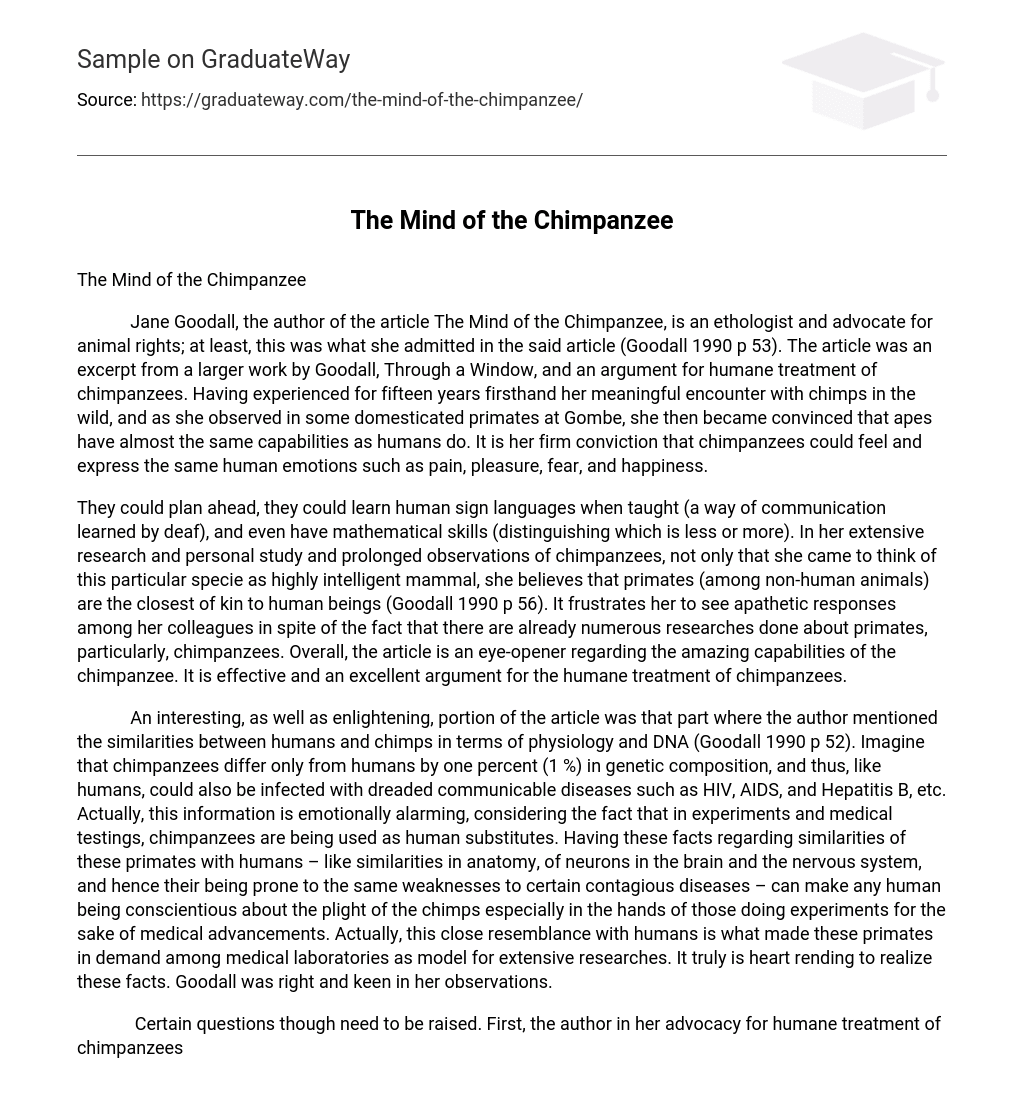Jane Goodall, the author of the article The Mind of the Chimpanzee, is an ethologist and an advocate for animal rights; at least, this was what she admitted in the said article (Goodall 1990 p 53). The article was an excerpt from a larger work by Goodall, Through a Window, and an argument for humane treatment of chimpanzees. Having experienced for fifteen years firsthand her meaningful encounter with chimps in the wild, and as she observed in some domesticated primates at Gombe, she then became convinced that apes have almost the same capabilities as humans do. It is her firm conviction that chimpanzees could feel and express the same human emotions such as pain, pleasure, fear, and happiness.
They could plan ahead, they could learn human sign languages when taught (a way of communication learned by the deaf), and even have mathematical skills (distinguishing which is less or more). In her extensive research and personal study and prolonged observations of chimpanzees, not only that she came to think of this particular specie as a highly intelligent mammal, she believes that primates (among non-human animals) are the closest of kin to human beings (Goodall 1990 p 56). It frustrates her to see apathetic responses among her colleagues in spite of the fact that there are already numerous researches done about primates, particularly, chimpanzees. Overall, the article is an eye-opener regarding the amazing capabilities of the chimpanzee. It is effective and an excellent argument for the humane treatment of chimpanzees.
An interesting, as well as enlightening, a portion of the article was that part where the author mentioned the similarities between humans and chimps in terms of physiology and DNA (Goodall 1990 p 52). Imagine that chimpanzees differ only from humans by one percent (1 %) in genetic composition, and thus, like humans, could also be infected with dread communicable diseases such as HIV, AIDS, and Hepatitis B, etc. Actually, this information is emotionally alarming, considering the fact that in experiments and medical testings, chimpanzees are being used as human substitutes.
Having these facts regarding similarities of these primates with humans – like similarities in anatomy, of neurons in the brain and the nervous system, and hence their being prone to the same weaknesses to certain contagious diseases – can make any human being conscientious about the plight of the chimps especially in the hands of those doing experiments for the sake of medical advancements. Actually, this close resemblance to humans is what made these primates in demand among medical laboratories as a model for extensive researches. It truly is heart rending to realize these facts. Goodall was right and keen in her observations.
Certain questions though need to be raised. First, the author in her advocacy for humane treatment of chimpanzees borders on equating chimps among humans. She is only a step short of elevating these apes to human standing. Is this proper? Although she admitted readily in her mention of Lucy (a well-known chimp raised from its infancy in a human family) that in spite of Lucy’s being cultured and advanced training, the chimp, although not anymore chimp-like in her overall behavior, still, was “eons away” from being human.
In the article, Goodall’s argument was stretched to the point of almost an advocacy for accepting chimps like humans. There has to be an acceptance or differentiations between man and animal. Jane Goodall’s poignant descriptions of her acquired knowledge of chimpanzees in her personal research of the specie were informative and might create “conscience” among medical practitioners (especially those engage in more advance researches) who cold-bloodedly perform their experiments motivated by medical breakthroughs alone. Second, if ever this article by Goodall has led some into thinking that the use of chimpanzees in laboratories (killing them) for the sake of medical advancements and for the greater benefit of humankind is ethically wrong, what should be done to save the lives of these primates, and also save many human lives? The Mind of the Chimpanzee is indeed thought-provoking, but Goodall must clarify these pertinent questions, as the same questions were somehow raised as one reads her article.





